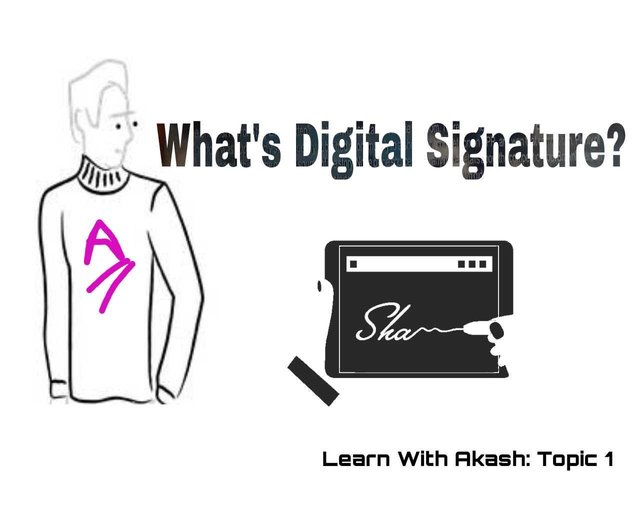Learn With Akash!! What is Digital Signature? Topic 1

Have a curiosity about What is Digital Signature. Read below:😊😊
Digital Signature🔌💻📖
A digital signature or digital signature scheme is a type of asymmetric cryptography used to simulate the security properties of a handwritten signature on paper. Digital signature schemes normally give two algorithms, one for signing which involves the user's secret or private key, and one for verifying signatures which involves the user's public key. The output of the signature process is called the "digital signature."  )
A signature provides authentication of a "messages" . Messages may be anything, from electronic mail a contract, or even a message sent in a more complicated cryptographic protocol. Digital signatures are used to create public key infrastructure (PKI)schemes in which a user’s public key (Whether for public-key encryption, digital signatures. or any other purpose) is tied to a user by a digital identity certificate issued by a certificate authority. PKI schemes attempt to unbreakably bind user information (name, address, phone number, etc.) to a public key, so that public keys can be used as a form of identification.
)
A signature provides authentication of a "messages" . Messages may be anything, from electronic mail a contract, or even a message sent in a more complicated cryptographic protocol. Digital signatures are used to create public key infrastructure (PKI)schemes in which a user’s public key (Whether for public-key encryption, digital signatures. or any other purpose) is tied to a user by a digital identity certificate issued by a certificate authority. PKI schemes attempt to unbreakably bind user information (name, address, phone number, etc.) to a public key, so that public keys can be used as a form of identification.
A digital signature scheme typically consists of three algorithms:
*A key generation algorithm G, that randomly produces a "key pair" (PK, SK) for the signer. PK is the verifying key, which is to be public, and SK is the signing key, to be kept private.
A Signing algorithm S, that, on input of a message m and a signing key SK. produces a signature 0.
A Signature verifying algorithm V, which on input a message m, a verifying key PK, and a Signature 0, either accepts or rejects.
Benefits of Digital Signatures Authentication: Digital signatures can be used to authenticate the source of messages. When ownership of a digital signature secret key is bound to a specific user, a valid signature shows that the message was sent by that user. For example, suppose a bank's branch office sends instructions to the central office requesting a change in the balance of an account. If the central office is not convinced that such a message is truly sent from an authorized source, acting on such a request could be a grave mistake.
Integrity: In many cases, the sender and receiver of a message may have a need for trust that the message has not been altered during transmission. Although encryption hides the contents of a message, it may be possible to change an encrypted message without understanding it. However, if a message is digitally signed, any change in the message will invalidate the signature. Furthermore, there is no efficient way to modify a message and its signature to produce a new message with a valid signature, because this is still considered to be computationally infeasible by most cryptographic hash functions.
Non-repudiation: It is an important aspect of digital signatures. By this property an entity has signed some information cannot at a later time deny having signed it Slimlarly access to the public key only does not enable a fraudulent party to fake a valid signature.